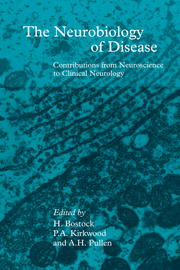Book contents
- Frontmatter
- Contents
- List of contributors
- Preface
- Part I Physiology and pathophysiology of nerve fibres
- Part II Pain
- Part III Control of central nervous system output
- 18 Synaptic transduction in neocortical neurones
- 19 Cortical circuits, synchronization and seizures
- 20 Physiologically induced changes of brain temperature and their effect on extracellular field potentials
- 21 Fusimotor control of the respiratory muscles
- 22 Cerebral accompaniments and functional significance of the long-latency stretch reflexes in human forearm muscles
- 23 The cerebellum and proprioceptive control of movement
- 24 Roles of the lateral nodulus and uvula of the cerebellum in cardiovascular control
- 25 Central actions of curare and gallamine: implications for reticular reflex myoclonus?
- 26 Pathophysiology of upper motoneurone disorders
- 27 Modulation of hypoglossal motoneurones by thyrotropin-releasing hormone and serotonin
- 28 Serotonin and central respiratory disorders in the newborn
- 29 Are medullary respiratory neurones multipurpose neurones?
- 30 Reflex control of expiratory motor output in dogs
- 31 Abnormal thoraco-abdominal movements in patients with chronic lung disease
- 32 Respiratory rhythms and apnoeas in the newborn
- 33 Cardiorespiratory interactions during apnoea
- 34 Impairment of respiratory control in neurological disease
- 35 The respiratory muscles in neurological disease
- Part IV Development, survival, regeneration and death
- Index
35 - The respiratory muscles in neurological disease
from Part III - Control of central nervous system output
Published online by Cambridge University Press: 04 August 2010
- Frontmatter
- Contents
- List of contributors
- Preface
- Part I Physiology and pathophysiology of nerve fibres
- Part II Pain
- Part III Control of central nervous system output
- 18 Synaptic transduction in neocortical neurones
- 19 Cortical circuits, synchronization and seizures
- 20 Physiologically induced changes of brain temperature and their effect on extracellular field potentials
- 21 Fusimotor control of the respiratory muscles
- 22 Cerebral accompaniments and functional significance of the long-latency stretch reflexes in human forearm muscles
- 23 The cerebellum and proprioceptive control of movement
- 24 Roles of the lateral nodulus and uvula of the cerebellum in cardiovascular control
- 25 Central actions of curare and gallamine: implications for reticular reflex myoclonus?
- 26 Pathophysiology of upper motoneurone disorders
- 27 Modulation of hypoglossal motoneurones by thyrotropin-releasing hormone and serotonin
- 28 Serotonin and central respiratory disorders in the newborn
- 29 Are medullary respiratory neurones multipurpose neurones?
- 30 Reflex control of expiratory motor output in dogs
- 31 Abnormal thoraco-abdominal movements in patients with chronic lung disease
- 32 Respiratory rhythms and apnoeas in the newborn
- 33 Cardiorespiratory interactions during apnoea
- 34 Impairment of respiratory control in neurological disease
- 35 The respiratory muscles in neurological disease
- Part IV Development, survival, regeneration and death
- Index
Summary
Respiratory muscle involvement in neurological disease may be underestimated because of the reduced mobility that may occur in these conditions. As the respiratory muscles are vital for life, formal tests of respiratory muscle function have an important role in neurological disorders. Moderate degrees of impairment may be associated with nocturnal hypoventilation, whereas more severe involvement leads to respiratory failure. If acute this can lead to respiratory arrest, and if of gradual onset may be associated with signs of cor pulmonale. Weakness of the expiratory muscles may impair coughing and bulbar weakness may lead to aspiration.
Respiratory muscle weakness may be produced by lesions affecting the central nervous system, the peripheral nerves, the neuromuscular junction or the muscles themselves.
Central nervous system
Respiratory dysfunction is seen in patients after hemiplegia secondary to cerebrovascular disease (De Troyer, Zegers de Beyl & Thirion, 1981). Patients with a unilateral corticospinal lesion demonstrate reduced activity of both the intercostal muscles and the diaphragm on the side of the paresis during inspiration.
Parkinson's disease may lead to low vital capacity and a reduction in maximum inspiratory effort (Bogaard et al., 1989). Bruin and colleagues recently concluded that anti-parkinsonian medication improved the co-ordination of upper airways and chest wall musculature, particularly during rapid events such as coughing and swallowing, and therefore might reduce the incidence of aspiration (De Bruin et al., 1993). Chorea may impose involuntary efforts on the normal respiratory pattern (Newsom-Davis, 1970).
- Type
- Chapter
- Information
- The Neurobiology of DiseaseContributions from Neuroscience to Clinical Neurology, pp. 358 - 370Publisher: Cambridge University PressPrint publication year: 1996



